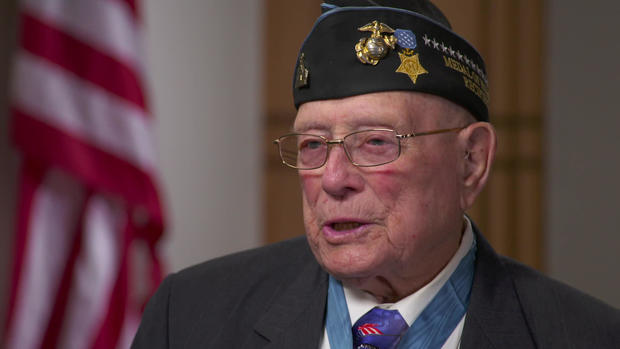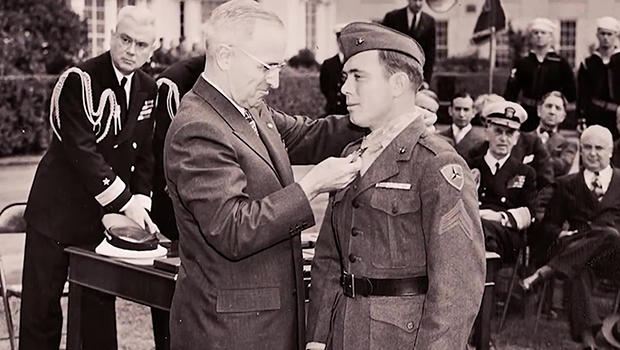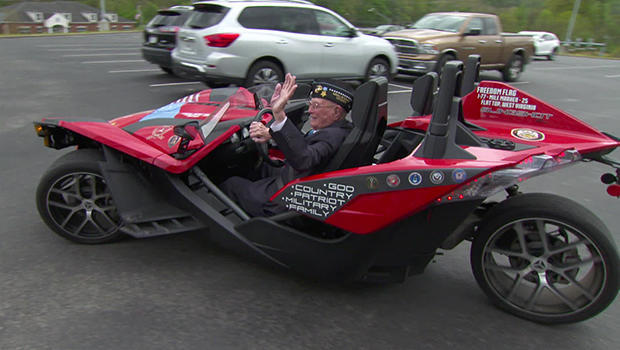Hershel "Woody" Williams is literally one-of-a-kind. At the age of 97 he is the last living recipient of the Medal of Honor from World War II. But it's the way he's lived all those years since that really sets him apart.
"I felt that I owed back more than I could ever possibly give," he told CBS News national security correspondent David Martin.
He grew up on a farm in West Virginia during the Great Depression. "There were 11 born to my family," he said. "Only five of us survived to adulthood."
After Pearl Harbor, he tried to enlist in the Marines, but was rejected as too short. When the Marines started taking horrendous casualties fighting the Japanese across the Pacific, the height limit was eased – and he ended up a Marine.
Martin asked, "What was your first taste of combat like?"
"Exceedingly scary," he replied.
In February 1945, a massive invasion fleet gathered off the Japanese-held island of Iwo Jima. "We didn't know that they had 22,000 Japanese on the island; we didn't know that they had miles of tunnel dug out in a volcano," Williams said.
The Japanese held their fire until after the Marines had landed, and then turned the beach into a slaughterhouse: "The beach was just full of everything you can think of -- trucks and tanks just blown up."
More than 6,000 Marines would die. Williams said, "Just stacked them up, yeah, like cord wood."
Finally, Marines made it to the top of Mount Suribachi for the most famous flag raising in American history.
Martin asked, "Did you know the flag had gone up?"
"No, I did not," Williams said. "I think I had my head buried in the sand."
The flag was up, but the battle for Iwo Jima was far from over: "There was no protection. We would run from shell crater to shell crater, if we could find one, and finally we hit this long line of pillboxes, reinforced concrete pillboxes."
Japanese machine guns inside the pillboxes cut down the advancing Marines, until Williams' commander turned to him: "He said, 'Do you think you could do something with the flamethrower?'"
"What were you supposed to do with the flamethrower?" Martin asked.
"Put flame in the pillbox. so that you would annihilate everybody within that pillbox."
With covering fire from four riflemen, Williams crawled toward the first pillbox with Japanese bullets ricocheting off his flamethrower.
"I look up on top of this pillbox and I see a little bit of blue smoke rolling out of the top of it,' Williams said. "So, I crawled up ... got up on top of that pillbox, and here's a pipe that is just about the same size as my flamethrower nozzle, so I just stuck it down and let it go. That was my first pillbox."
Williams is credited with taking out seven pillboxes in the course of four hours.
That was February 1945. When Japan surrendered in September of that year, Williams was on Guam killing time when he suddenly received a summons: "'You're gonna go see the general.' And I said, 'What for?'"
"Can't be good news!" said Martin.
"That's what I thought!" Williams laughed. "I'm scared to death, but I'm following orders, you know, so I walk into the tent, walk up to his desk. And he said, 'You're being ordered back to Washington.' I'd never heard of the Medal of Honor. I didn't know such a thing existed."
The boy from quiet Dell, West Virginia found himself at the White House being presented the Medal of Honor by President Truman. "I never even dreamed of being able to see a President of the United States, and I'm standing shaking hands with him. Now, you talk about a scared moment! I was a wreck, I really was!"
He got over the nerves, but never the responsibility that comes with the medal, especially when he learned that Corporal Warren Bornholz and Private First Class Charles Fischer, two of the riflemen who had provided covering fire during those four hours of flaming hell, had been killed.
"Once I learned that, my whole concept of the medal changed. I said, 'This medal does not belong to me; it belongs to them.' So, I wear it in their honor, not mine. They sacrificed their lives to make that possible."
Williams learned what that sacrifice meant to their families at an early age. Before he joined the Marines, he delivered Western Union telegrams informing mothers that their sons had been killed in action. "When I handed her the envelope, well, she just collapsed," he recalled. "As an 18-year-old boy, I didn't know what to do. I didn't do anything. I left. You know, I didn't know what to do."
"You've done a pretty good job of making up for it," Martin said.
"Well, it left a lasting impression on my mind. Made me realize what it costs just to have our freedom and be who we are," he said.
He worked for the Department of Veterans Affairs for 33 years. Afterwards, he set up the Woody Williams Foundation to support Gold Star families, and designed a monument in their honor. "We're in all 50 states," he said.
"Does that require a lot of travel on your part?"
"We try to attend every dedication and every groundbreaking."
Before COVID hit, this 90-something would be on the road more than 200 days a year.
Martin asked, "Why do you drive yourself like that? At your age, everybody would understand if you begged off."
"This is my way of making sure that our Gold Star family members are not forgotten," Williams replied.
This past April, Charles Coolidge, the only other living Medal of Honor recipient from World War II, passed away.
Martin said, "Now you're the last man standing."
"Yeah."
"Does that add to the feeling of responsibility?"
"Yes, it does. It does."
"Do you ever wonder why you've been given so long to live?"
"Maybe I'm making somebody else's life a little better, a little more meaningful," he replied.
"Woody" Williams has led the most meaningful life possible, although he puts it differently: "I'm just absolutely the most fortunate person you could lay your eyes on," he said.
And one more thing we learned about the last man standing: he's also the coolest 97-year-old in the United States of America.
For more info:
Story produced by Mary Walsh. Editor: Joseph Frandino.
"continued" - Google News
May 30, 2021 at 08:50PM
https://ift.tt/3uBifyb
A Medal of Honor recipient's continued service - CBS News
"continued" - Google News
https://ift.tt/2WiTaZN
https://ift.tt/2YquBwx
Bagikan Berita Ini

















0 Response to "A Medal of Honor recipient's continued service - CBS News"
Post a Comment